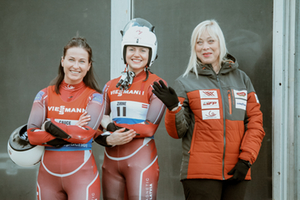Team Latvia: “Regardless of what the season will look like due to Covid-19, we will be ready for it!”
Sigulda (FIL) Latvia was less affected by COVID-19 than other European countries. The Latvian government declared a national state of emergency on March 17th. This meant that the Latvian national luge team was able to train on the home track in Sigulda for another two weeks after returning from the World Cup finals in Königssee (Germany). On the first weekend, the Latvian Championships took place.
National Team Manager and Coach Kristaps Mauriņš remembers: “Originally we had planned to train for at least one more week, but COVID-19 spread quickly and unfortunately we had to finish the season earlier than we expected. The national state of emergency lasted almost three months, until June 9th. But compared to other European countries, there was no time when a complete lockdown was declared. The strictest restrictions we had were for a few weeks when people could only go out on the streets in pairs from one household, always keeping a distance of two metres.”
Team Manager Kristaps Mauriņš, who himself still participated as a luge athlete in the Olympic Winter Games in Sochi 2014, is glad: “I have to say that the virus has spread in Europe at a very fortunate time for us. We would all have been on our annual holiday shortly after the pandemic began. So the preparations for next season were not significantly affected. During the first month of COVID-19 all athletes took time off from the season. We used the time to recover and to treat injuries that occurred throughout the year. During the second month of suspension, the team members trained according to individual training programs and had three endurance training sessions per week.”
In April and May it was not allowed to visit friends or family if they did not live in the same household. All gymnasiums, cinemas and shopping centres were closed and all public events were cancelled to avoid unnecessary gatherings. During this time, all schools, universities and most workplaces, if possible, worked remotely.
Coach Mauriņš further reports: “During this state of emergency we mostly kept in touch by phone, using WhatsApp or email to communicate with athletes, coaches and federation members. The biggest challenge during this time was to actually create a training program and to understand how we could effectively move forward if the situation in the country did not ease before the coming preseason. There was a lot of uncertainty because we didn't know when the gyms would open and when exactly we could train together. So we decided to buy our own fitness equipment and train outdoors. This meant we were not dependent on the gyms reopening. Fortunately, in mid-May the restrictions became less and less strict and our team could finally start training together again, while observing all hygiene and distancing rules.”
The Latvian luge coach made wise use of the time at home: “I personally completed my bachelor thesis at the Latvian Academy for Sports Education during this time, followed by an unusual graduation ceremony with all the restrictions of COVID-19. We have been training with the team since May 18th. During the first three weeks there were still very strict rules and recommendations for hygiene routines and distancing. However, in June the situation in the country improved and the restrictions were removed. Since then, we have been able to train like we used to. Mostly we train in Murjani and Sigulda. Once a month we have a one week training camp in one of the other Latvian cities. The next week of training is scheduled for August 10th to 14th in Dobele.”

The ice season in Sigulda will start at the beginning of October for the Latvian team. Whether the national team can then hold an international training week in Norway or Germany is difficult to predict at the moment. It depends on how the virus situation develops. The coach and team manager is setting priorities: “In the coming season we will host European Championships in Sigulda. We want to prepare as well as possible for this event at home. I believe that it is almost impossible to arrange the pre-Olympic season as it was originally planned before COVID-19, because we cannot predict the development of the virus and the associated travel restrictions. In my opinion, one of the main goals of this season is to enable pre-homologation and a World Cup in China to test the newly built track before the Beijing Olympics. We must find a solution to provide a safe environment for all those who are travelling to China. We are patiently waiting for the FIL to publish the final schedule to see what the season might look like. In the meantime, we are continuing to work hard to be in top form when the races start!”








